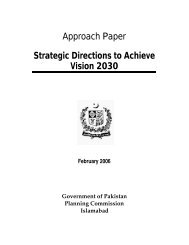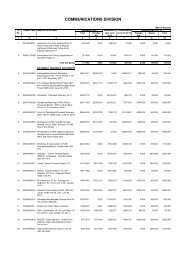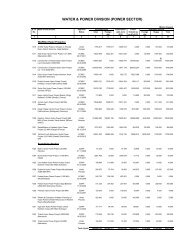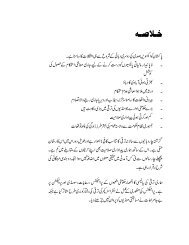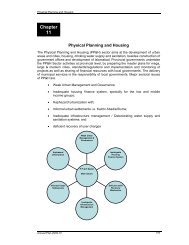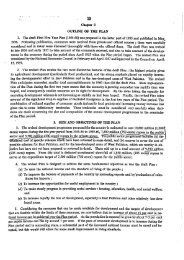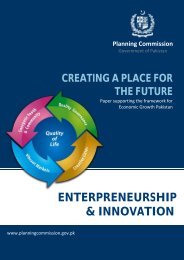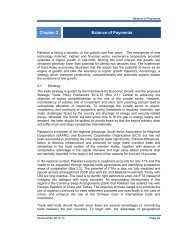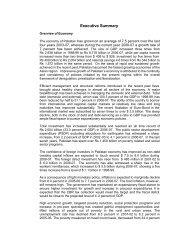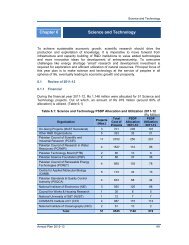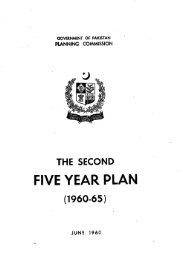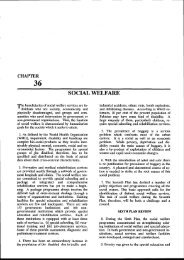Framework for Economic Growth, Pakistan - Planning Commission
Framework for Economic Growth, Pakistan - Planning Commission
Framework for Economic Growth, Pakistan - Planning Commission
Create successful ePaper yourself
Turn your PDF publications into a flip-book with our unique Google optimized e-Paper software.
International conference on “<strong>Framework</strong> <strong>for</strong> <strong>Economic</strong> <strong>Growth</strong>, <strong>Pakistan</strong>”do with the political manifesto. Some factsthat this document is addressing are the keyissues we are facing today in <strong>Pakistan</strong>. Forinstance chapter on vibrant markets gives uscertain points which are new and we aregoing to implement it in next two years. Ithink that no government will disown it. Forinstance this document talks about ‘Transferof Property Act 1882’. Who is going to denythat it needs to be addressed and changed?This document also talks aboutcomputerization of land records whichnobody is going to deny. This documentsays to unify NTN and GST registration toone tax registration number and nobodywould disagree with it. This document isasking <strong>for</strong> the repeal of “AgricultureProduce Market Act, 1939” which is againsomething important and whoever is there inpower should look at it. So there are somany important areas identified in thisdocument which we can’t ignore.About ownership of this document I wouldsay that the biggest problem this book hashighlighted is lack of continuity. If there iscontinuity and political stability we hopethat the system we have evolved would notbe disrupted. If political system hascontinuity the system here will also move.You have given the example of Indonesiaand Malaysia. I think from mid-seventiesonwards there has been a continuity andstability in their political system. Everygovernment has owned what the parliamentand collective wisdom have decided there.***Closing Remarks ByAjay ChhibberAssistant Secretary General, UN and Assistant Administrator andRegional Director <strong>for</strong> the Asia and the Pacific, UNDPThank you very much Dr. Nadeem and Ireally add my concurrence to what the twoesteemed members of parliament have justsaid. What has to happen is the consensusaround the direction of change which isneeded here. The real question here is thatwhatever government comes, as you rightlysaid, that must own it. There is a need tocarry on this document and I think it is veryimportant. I think there is a consensusamong your thoughtful people - like thepeople we have here in this room. Of courseyou must keep widening the circle. I can tellyou that I have never attended anything likethis in any other country. I must congratulateDr. Nadeem Ul Haque and the <strong>Planning</strong><strong>Commission</strong> the way this opening has cometogether and the way the energy of youthhave been involved into this discussion. Iknow this is coming after many events thatyou have already done in past. I think thatall those countries in Asia which aregrowing so fast developed a consensus onsuch issues over a period of time and thenwhichever person comes in the powerfollowed that direction more or less. Thatsort of consensus should also happen in<strong>Pakistan</strong> and it should not be question of oneelection or the other.We would really support <strong>Pakistan</strong> inimplementation of FEG <strong>for</strong> which our‘<strong>Growth</strong> Centre’ would be a kind of placewhich will generate such kind of good ideasand discussions. It is a large agenda anddefinitely some sequencing would beneeded. Some low hanging fruits would beneeded to get started quickly. To start withthe work like Civil Services Re<strong>for</strong>ms andderegulation are harder to start with. We126



